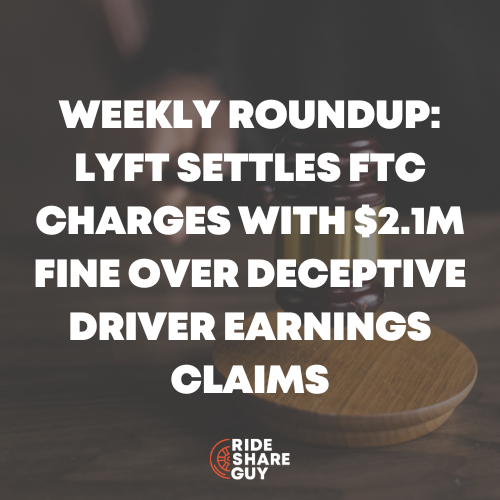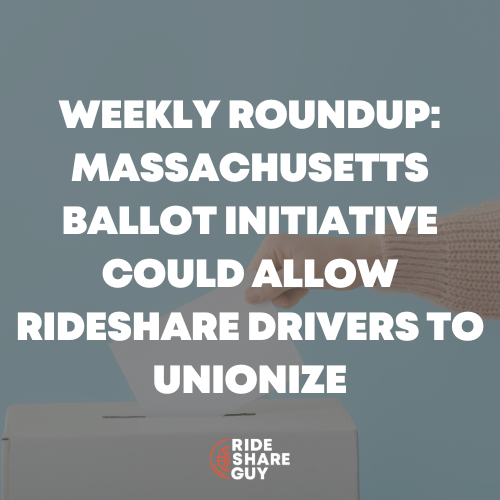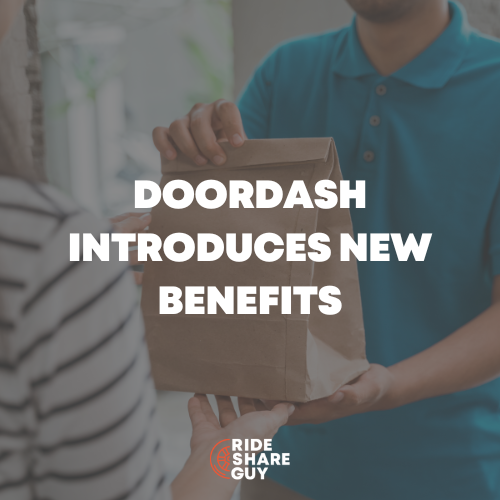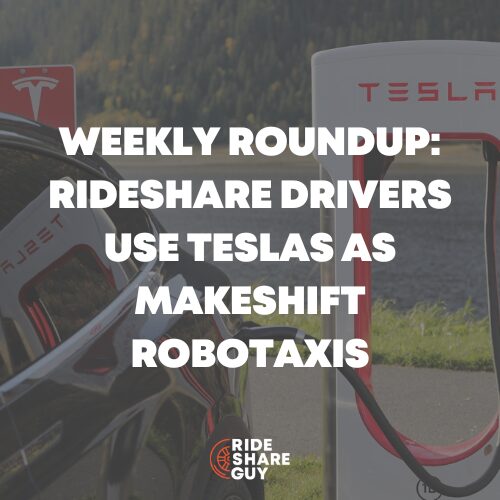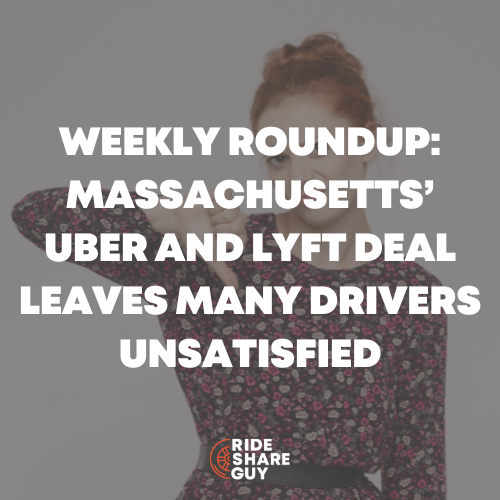Gig workers are ready to stick it to the “man”. RSG’s Sergio Avedian was one of them. Keep reading to hear his story. Also in our weekly round-up is Fetii and Quik Carry, two rideshare apps trying to make their mark.
Column: Two Uber drivers read the fine print – and won millions for California gig workers
Topic Originally Appeared On LA Times
Summary
Pablo Gomez has been a full-time Uber driver since 2019. He takes pride in knowing how to maximize his earnings on each trip he takes. That means knowing the right times to drive, which rides to accept and which to pass up — and it also means knowing the letter of the law that governs his trade. In particular, it means knowing Proposition 22, the controversial ballot measure that passed in 2020 and became law in 2021, inside and out.
For the gig drivers of California, Gomez’s eagle-eyed attention to detail, paired with a fellow driver’s fighting spirit, resulted in a windfall that could be worth hundreds of millions of dollars.
Proposition 22, you might recall, overrode AB 5, a law that classified gig workers as employees, entitling them to benefits and protections. The ballot measure instead enshrined app-based gig workers as independent contractors, and put in place a raft of better-than-nothing half-measures: Instead of full healthcare coverage, gig workers got a healthcare subsidy, if they worked enough hours to qualify. Instead of a minimum wage, drivers got a minimum earnings guarantee — but only for “engaged” miles, not time spent between rides….
My Take
There are always loopholes, and if you have the time and the drive to find them, you can utilize them to your advantage. That’s exactly what senior RSG contributor Sergio Avedian did along with his companion Pablo Gomez.
Luckily this time, it also benefited thousands of other drivers, and the platforms started issuing reimbursements immediately, likely so they wouldn’t have to deal with mitigation.
Hopefully, both the state and the platforms have learned their lesson and will implement the new rates on a regular basis instead of waiting for drivers to figure it out.
As long as Sergio is around, he’s going to be watching for this kind of thing and you bet he’ll nail them on it. Each and every time.
Were you one of the drivers in California that saw an adjustment? How much did you earn from it? Share in the comments!
Ford offering flexible EV leases to Uber drivers
Topic Originally Appeared On The Verge
Summary
Ford is teaming up with Uber to offer flexible leases on electric vehicles to rideshare drivers.
Uber is under pressure from governments around the world to get more of its drivers into EVs to reduce tailpipe pollution and fight climate change. And Ford is eager to get more of its Mustang Mach-Es on the road as it pours billions of dollars into EV production while incurring huge losses.
Under the new Ford Drive program, Uber drivers would be able to lease a Mustang Mach-E for flexible terms, either one or four months, depending on the location. And there are other benefits as well….
My Take
EVs continue to be a main focus of the government and other agencies. It’s great that they are starting to offer more options.
It’s only once they realize not everyone can afford an EV and not everyone is comfortable with the technology and range of EVs that they will start to cater to the majority of drivers out there.
Within the past year, I bought a new-to-me vehicle. Was it an EV? No. Did I consider an EV? No.
My house is not set up for that and there aren’t any charging stations near me in the middle of basically nowhere Minnesota.
Overall, I wouldn’t mind switching to an EV in the future, but it just wasn’t practical for me to make that change right now. I couldn’t afford to update my electrical panels plus buy a new vehicle. It was just not feasible. And a lot of people are in the same boat.
When you hear people complaining about gas prices, a lot of others will say something along the lines of “Buy an EV”. Well, easier said than done in a lot of cases. They’ve got to ease the general public into it and make it as easy as possible to make the transition.
Related:
Uber drops ride discounts for subscribers, switches to cash back
Topic Originally Appeared On Tech Crunch
Summary
Uber is dropping the 5% discounts on eligible rides that it previously offered members of its Uber One subscription service, according to an email sent to customers. Starting on their next billing cycle, subscribers will now earn 6% of so-called “Uber Cash” on eligible rides that can be spent on Uber and Uber Eats.
It’s a risky move for Uber as the ride-hailing and delivery giant aims to boost bookings among subscribers. Since Uber launched Uber One in 2021 for $9.99 per month or $99.99 annually, discounts on rides have been a huge adoption driver. According to Uber’s full-year earnings report, Uber One memberships grew 100% in 2022 to roughly 12 million members. While Uber can increase its profit margins by switching to a cash-back offer, it also faces the possibility of losing customers who are in it for the discounts.
“I only subscribed for the discounted rides, so I’ll go ahead and cancel now,” Harri Weber, a colleague, and erstwhile Uber One subscriber told TechCrunch….
My Take
I get the logic behind this, but it still kind of stings for Uber One subscribers, unless they order Ubers and Uber Eats a lot.
Personally, I feel like most would prefer instant gratification over the promise of a discount in the future.
There’s always a point where the company is ahead/the customer is behind. And no customer enjoys being in the negative. They’d rather have their discounts up front and counted for instead of having to promise to use future services.
Granted, that could just be the way I think. I have never used Uber regularly enough to justify their subscription service in the first place. If you have Uber One, what do you think of this change?
A Black-Owned Ride Share App Is Bridging The Gap Left Open By Striking Uber And Lyft Drivers
Topic Originally Appeared On Essence
Summary
Rideshare has become a hallmark of our culture, but the disruptive industry is being, well, disrupted and it’s affecting its large consumer base. Fortunately, a Black-owned company is aiming to help passengers move to get to their destinations.
Quik Carry, a ride-hailing app that focuses on transportation solutions for customers in the southern U.S. region, particularly Atlanta, Ga, and South Florida, recognizes the golden opportunity they have to position themselves as a reliable ride-share option as costs continue for leading contenders Ubers and Lyft.
“Drivers are the ultimate beneficiaries of utilizing an innovative business model,” a statement from Quik Carry said per a news release obtained by Black Enterprise. “During their first month of driving, they receive a remarkable 100% of their earnings, while subsequent rides provide them with an ongoing 50% share, making Quik Carry the most profitable option for drivers in the market.”…
My Take
While Uber and Lyft are busy figuring out how to meet their bottom line and keep investors happy, platforms like Quik Carry (and later we’ll get into Fetii) are taking advantage to set themselves up for success.
The cost of an Uber or a Lyft has gone up significantly over the years, most especially coming out of the pandemic.
But the pay for drivers has remained steadfast or in some cases, lowered over the years, making it near impossible to make a living off of this gig.
When Uber and Lyft first implemented their platforms, they were giving out bonuses and guarantees like they were going out of style, drawing drivers in with these incentives. It was fairly easy and straightforward to earn a decent wage.
Now, in some markets, drivers find it difficult to justify working for these platforms because of the low wages.
As things continue to shift, the major platforms for rideshare may find themselves with more and more competition.
Bill Mandating Uber, Lyft Driver Pay Rates Vetoed in Minnesota
Topic Originally Appeared On Bloomberg Law
Summary
Lyft Inc. and Uber Technologies Inc. won’t have to follow state-mandated minimum driver pay or restrictions on how they deactivate drivers in Minnesota after Gov. Tim Walz vetoed rideshare legislation that the industry opposed.
Walz vetoed the legislation (HF 2369) and ordered a study of rideshare driver pay and working conditions.
“Rideshare drivers deserve fair wages and safe working conditions. I am committed to finding solutions that balance the interests of all parties, including drivers and riders,” Walz (DFL) said Thursday in announcing the veto. “This is not the right bill to achieve these goals.”…
My Take
Well, this is a blow to drivers in Minnesota. Since I live in this state, I’ve been following this pretty closely, along with driver feedback.
Drivers in Minnesota did see a downturn in ride requests through Uber over the past couple of weeks. Some assume it’s because Uber was preparing to leave Minnesota and passengers were taking the hint and grabbing a Lyft instead.
Of course, since the governor of Minnesota vetoed the bill, things should shake out to normal in the coming weeks.
But did Uber just shoot itself in the foot in this market? Will passengers and drivers simply leave Uber in the dust like the platform was prepared to do if they were asked to give drivers a minimum wage (like they’ve done successfully in other markets)?
I’ll be keeping my eye on Uber here in Minnesota. We’re a state that’s not to be trifled with.
RSG in the News This Week
Read more trending topics in the news this week:
